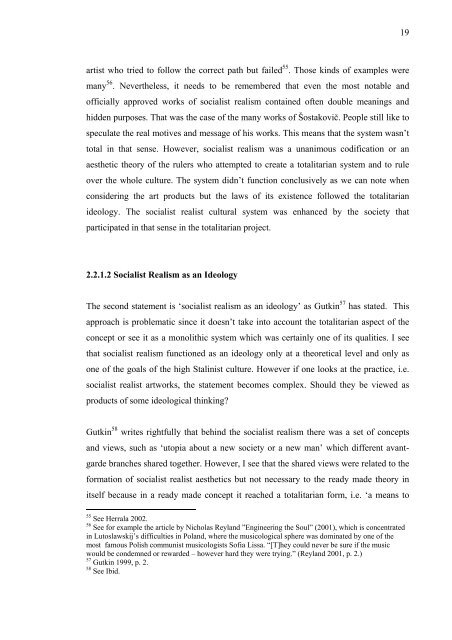Boris Asaf'ev and the Soviet Musicology - E-thesis
Boris Asaf'ev and the Soviet Musicology - E-thesis
Boris Asaf'ev and the Soviet Musicology - E-thesis
You also want an ePaper? Increase the reach of your titles
YUMPU automatically turns print PDFs into web optimized ePapers that Google loves.
artist who tried to follow <strong>the</strong> correct path but failed 55 . Those kinds of examples were<br />
many 56 . Never<strong>the</strong>less, it needs to be remembered that even <strong>the</strong> most notable <strong>and</strong><br />
officially approved works of socialist realism contained often double meanings <strong>and</strong><br />
hidden purposes. That was <strong>the</strong> case of <strong>the</strong> many works of Šostakovič. People still like to<br />
speculate <strong>the</strong> real motives <strong>and</strong> message of his works. This means that <strong>the</strong> system wasn’t<br />
total in that sense. However, socialist realism was a unanimous codification or an<br />
aes<strong>the</strong>tic <strong>the</strong>ory of <strong>the</strong> rulers who attempted to create a totalitarian system <strong>and</strong> to rule<br />
over <strong>the</strong> whole culture. The system didn’t function conclusively as we can note when<br />
considering <strong>the</strong> art products but <strong>the</strong> laws of its existence followed <strong>the</strong> totalitarian<br />
ideology. The socialist realist cultural system was enhanced by <strong>the</strong> society that<br />
participated in that sense in <strong>the</strong> totalitarian project.<br />
2.2.1.2 Socialist Realism as an Ideology<br />
The second statement is ‘socialist realism as an ideology’ as Gutkin 57 has stated. This<br />
approach is problematic since it doesn’t take into account <strong>the</strong> totalitarian aspect of <strong>the</strong><br />
concept or see it as a monolithic system which was certainly one of its qualities. I see<br />
that socialist realism functioned as an ideology only at a <strong>the</strong>oretical level <strong>and</strong> only as<br />
one of <strong>the</strong> goals of <strong>the</strong> high Stalinist culture. However if one looks at <strong>the</strong> practice, i.e.<br />
socialist realist artworks, <strong>the</strong> statement becomes complex. Should <strong>the</strong>y be viewed as<br />
products of some ideological thinking?<br />
Gutkin 58 writes rightfully that behind <strong>the</strong> socialist realism <strong>the</strong>re was a set of concepts<br />
<strong>and</strong> views, such as ‘utopia about a new society or a new man’ which different avantgarde<br />
branches shared toge<strong>the</strong>r. However, I see that <strong>the</strong> shared views were related to <strong>the</strong><br />
formation of socialist realist aes<strong>the</strong>tics but not necessary to <strong>the</strong> ready made <strong>the</strong>ory in<br />
itself because in a ready made concept it reached a totalitarian form, i.e. ‘a means to<br />
55<br />
See Herrala 2002.<br />
56<br />
See for example <strong>the</strong> article by Nicholas Reyl<strong>and</strong> ”Engineering <strong>the</strong> Soul” (2001), which is concentrated<br />
in Lutoslawskij’s difficulties in Pol<strong>and</strong>, where <strong>the</strong> musicological sphere was dominated by one of <strong>the</strong><br />
most famous Polish communist musicologists Sofia Lissa. “[T]hey could never be sure if <strong>the</strong> music<br />
would be condemned or rewarded – however hard <strong>the</strong>y were trying.” (Reyl<strong>and</strong> 2001, p. 2.)<br />
57<br />
Gutkin 1999, p. 2.<br />
58<br />
See Ibid.<br />
19

















